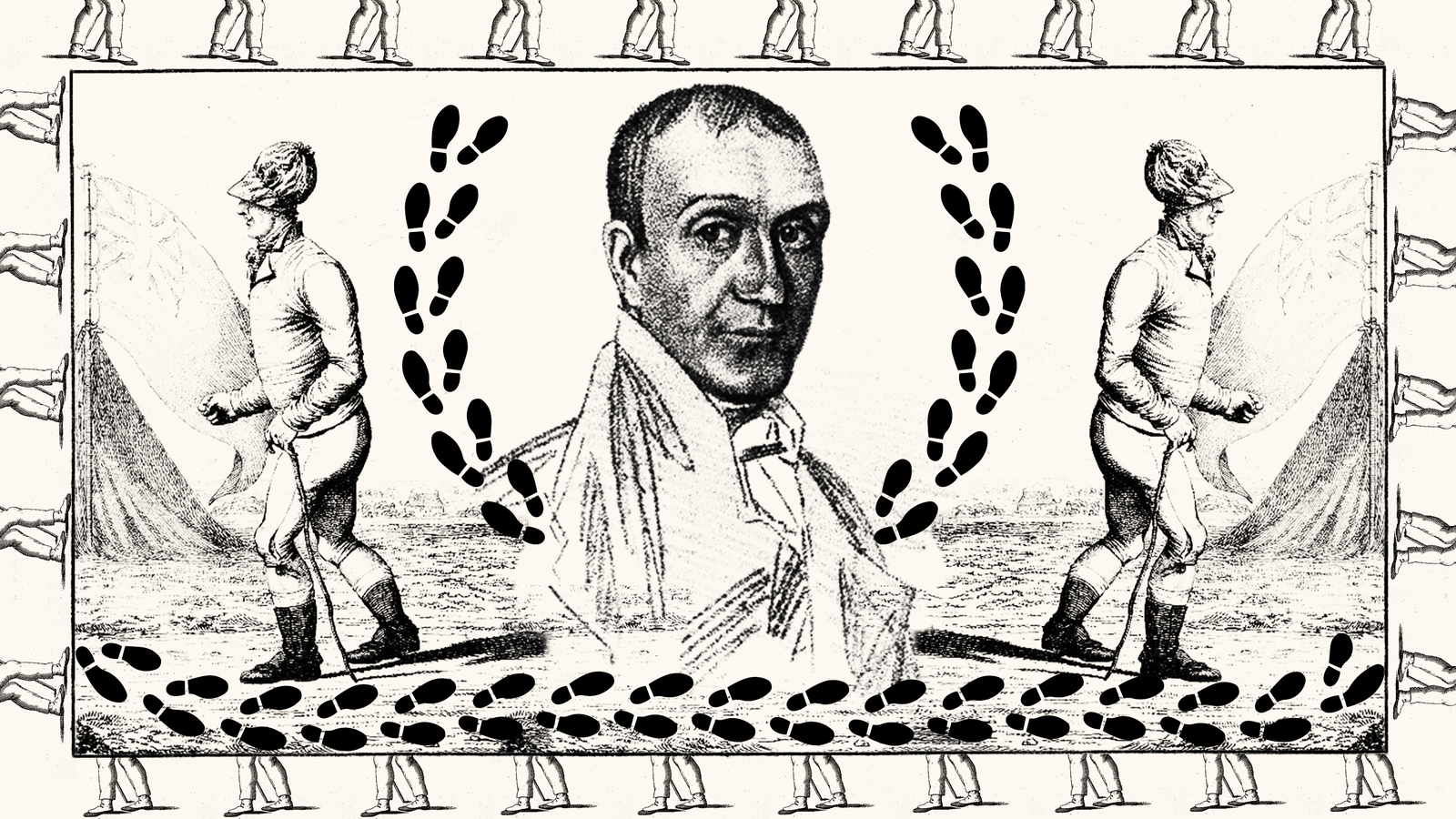The Man Who Walked His Life Away
Companies, agencies, institutions, etc
Wilson
Newgate Jail
The Sporting Magazine
the Newcastle Corporation—
the Scottish Highlands
Loch Ness
the Sporting Magazine
the British Army
Barclay’s
Madeira
AdvertisementHandbills
Hare
Billet
Looney
The Times of London
the Northampton Mercury
the Royal Agricultural Hall
the Newcastle Courant
the British Museum
AdvertisementPaul Brown
People
George Wilson
Newgate
relief.”Wilson
Robert Wilson
Isabella Tubman
John Cary
Rosa
Moray Firth
Ben Nevis
Montague Shearman’s
Foster Powell
Powell—
Robert Barclay Allardice
Tom Cribb
Tom Molineaux
Yohann Diniz
Paul S. Marshall
George Jr.
Hare
John Rice Williams
multitude.”Wilson
Lynn
Handel
Chelsea
undertakings.”Wilson
Pedestrianism
Charlie Rowell
George Hazael
Edward Payson Weston
Dan
Alston
George Wilson’s
Groups
Scottish
British
American
morning.”Blackheath
Physical locations
the Black Hole
Atlantic
the Conqu’ring Hero Comes
Places
Newmarket Racecourse
Barclay
The Newcastle Pedestrian”
The Blackheath Pedestrian.”By
the Blackheath Pedestrian
Madison Square Garden
Locations
Newcastle
Tyne
England
London
Manchester
Edinburgh
Britain
Newfoundland
York
Molineaux
Newmarket
standards.“Given
Blackheath
magistrates’
New York
Yorkshire
Norwich
Yarmouth
King
Cumbria
Events
the Napoleonic Wars
the First Industrial Revolution

Summary
But Wilson was well-known as a perambulator, a peregrinator, and a master of “leg-ology.” He was a celebrated competitive walker and a champion in the bizarre sport of pedestrianism.It was April 16, 1813, and Wilson was in prison for his failure to pay a debt of 40 pounds owed to his brother—in 2019 terms, roughly $3,200 USD. For his stake, Wilson pledged his only possession other than the ragged clothes on his back: his father’s watch, which he said he valued “almost as much as my life.” Wilson had been undertaking walking challenges for more than a decade, but never in such unusual circumstances. One newspaper described it as “probably the smallest track on record.” Wilson would have to make 2,575 laps of the yard to complete the 50-mile challenge. The Sporting Magazine described it as “an effort of human strength in so circumscribed a situation as stands unparalleled in the records of pedestrianism.” Wilson—“the Newcastle Pedestrian”—was now famous across Britain and now had three pounds and a shilling in his pocket, but the relief that brought him was short-lived.Wilson had in mind a much greater challenge over a much longer distance that would generate even wider fame. Man and dog huddled on the freezing cliff-edge overnight, “trembling with horror,” before carefully descending in the morning light.Wilson claimed he regularly completed his walking assignments “in little more than half the time expected ... Then, in 1809, he walked 360 miles over six consecutive days for a prize of 50 guineas.More than two hundred years later, the feats of Powell, Barclay, and Wilson seem relatively quaint when compared to the achievements of today’s athletes. But Wilson and his fellow pedestrians can’t be measured by modern standards.“Given exactly the same task, a modern-day athlete would find it almost impossible to accomplish what George Wilson and the ultra-tough 19th-century pedestrians managed,” says Paul S. “The profession of walking is not altogether a matter of choice,” he explained.In 1812, after several months away and thousands of miles walked, Wilson returned to Newcastle. In London he resumed his paid-for pedestrianism, walking 96 miles in 24 hours for 30 pounds, and used the money “to pay my debts and to fulfill the duties of a father.” Then came his greatest challenge.Captain Barclay’s 1809 achievement of walking one thousand miles in one thousand hours remained the greatest feat of pedestrianism and had not been topped in six years, despite several attempts. He would do so for the relatively modest prize of one hundred pounds, although he hoped wagers and subscriptions from benefactors might substantially increase his purse.AdvertisementHandbills were distributed all over London:“George Wilson, pedestrian, aged fifty years, proposes to perform the laborious task of walking one thousand miles in the space of twenty days at the rate of fifty miles a day, a task, if accomplished, will never have been surpassed—commencing on Monday the 11th of September, 1815, on Blackheath at six o’clock in the morning.”Blackheath is an area of grassland, about half a mile across, in south-east London. He walked 50 miles on the first day “without appearing the least fatigued.” “If God spares my health, and barring all accidents,” Wilson told journalists, “I am sure I shall complete my task.”Bookmakers were less sure, offering odds of 20 to 1. On the morning of the 16th day, having walked 751 miles, Wilson was arrested by a “posse” carrying a warrant stating that the pedestrian was “occasioning a considerable interruption to the peace of the inhabitants.”Wilson’s friends were outraged. Its remarkable full title was: A Sketch of the Life of George Wilson, the Blackheath Pedestrian; Who Undertook to Walk One Thousand Miles in Twenty Days!! In the pub garden in Hull, he would walk one thousand miles in just 18 days.He had chosen a private garden so he wouldn’t be obstructed—or arrested—but Wilson was still watched by a crowd of onlookers who paid for admission, or who had scaled the walls and climbed through hedges. On the 18th day, as he walked his one-thousandth mile, a band played Handel’s “See, the Conqu’ring Hero Comes.” Wilson completed the greatest challenge pedestrianism had ever seen with 40 minutes and 50 seconds to spare, “amidst the cheers of the populace.” He had finally eclipsed Barclay and become the greatest pedestrian the world had ever seen.Unfortunately, Wilson was once again short-changed. “The circumstances of my life,” he noted, “have been chequered with vicissitudes that, long since, would have reconciled me to the fate which must, sooner or later, be the common lot of humanity.”He died in 1839, aged 73, with the Newcastle Courant noting, understatedly, that Wilson was “well known in this town for his remarkable feats of pedestrianism.”His fame was worldwide but short-lived.
As said here by Paul Brown